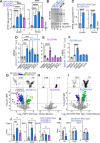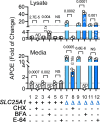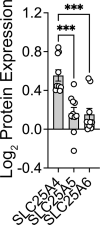APOE expression and secretion are modulated by mitochondrial dysfunction
- PMID: 37171075
- PMCID: PMC10231934
- DOI: 10.7554/eLife.85779
APOE expression and secretion are modulated by mitochondrial dysfunction
Abstract
Mitochondria influence cellular function through both cell-autonomous and non-cell autonomous mechanisms, such as production of paracrine and endocrine factors. Here, we demonstrate that mitochondrial regulation of the secretome is more extensive than previously appreciated, as both genetic and pharmacological disruption of the electron transport chain caused upregulation of the Alzheimer's disease risk factor apolipoprotein E (APOE) and other secretome components. Indirect disruption of the electron transport chain by gene editing of SLC25A mitochondrial membrane transporters as well as direct genetic and pharmacological disruption of either complexes I, III, or the copper-containing complex IV of the electron transport chain elicited upregulation of APOE transcript, protein, and secretion, up to 49-fold. These APOE phenotypes were robustly expressed in diverse cell types and iPSC-derived human astrocytes as part of an inflammatory gene expression program. Moreover, age- and genotype-dependent decline in brain levels of respiratory complex I preceded an increase in APOE in the 5xFAD mouse model. We propose that mitochondria act as novel upstream regulators of APOE-dependent cellular processes in health and disease.
Keywords: APOE; alzheimer's disease; cell biology; human; mitochondria; neuroscience.
© 2023, Wynne et al.
Conflict of interest statement
MW, OO, AL, AG, SZ, CX, ZW, DD, SR, AI, EO, ED, NS, BR, AC, VS, MP, NS, SK, SC, AB, AW, TW, SR, AL, EW, VF No competing interests declared
Figures



















Update of
References
-
- Afgan E, Baker D, Batut B, van den Beek M, Bouvier D, Cech M, Chilton J, Clements D, Coraor N, Grüning BA, Guerler A, Hillman-Jackson J, Hiltemann S, Jalili V, Rasche H, Soranzo N, Goecks J, Taylor J, Nekrutenko A, Blankenberg D. The Galaxy platform for accessible, reproducible and collaborative biomedical analyses: 2018 update. Nucleic Acids Research. 2018;46:W537–W544. doi: 10.1093/nar/gky379. - DOI - PMC - PubMed
-
- Akita T, Aoto K, Kato M, Shiina M, Mutoh H, Nakashima M, Kuki I, Okazaki S, Magara S, Shiihara T, Yokochi K, Aiba K, Tohyama J, Ohba C, Miyatake S, Miyake N, Ogata K, Fukuda A, Matsumoto N, Saitsu H. De Novo variants in Camk2A and Camk2B cause neurodevelopmental disorders. Annals of Clinical and Translational Neurology. 2018;5:280–296. - PMC - PubMed
Publication types
MeSH terms
Substances
Associated data
- Actions
Grants and funding
- RF1 AG060285/AG/NIA NIH HHS/United States
- RF1 AG071587/AG/NIA NIH HHS/United States
- P30 AG066511/AG/NIA NIH HHS/United States
- F32 AG064862/AG/NIA NIH HHS/United States
- T32 NS007480/NS/NINDS NIH HHS/United States
- T32 NS096050/NS/NINDS NIH HHS/United States
- F31 AG067623/AG/NIA NIH HHS/United States
- F31 NS127419/NS/NINDS NIH HHS/United States
- R01 NS114130/NS/NINDS NIH HHS/United States
- U01 AG061357/AG/NIA NIH HHS/United States
- UL1 TR002378/TR/NCATS NIH HHS/United States
- P30 AG066546/AG/NIA NIH HHS/United States
- R01 AG075820/AG/NIA NIH HHS/United States
LinkOut - more resources
Full Text Sources
Molecular Biology Databases
Miscellaneous

